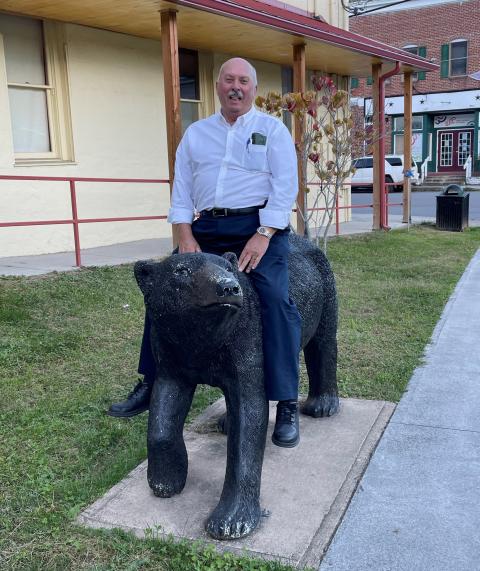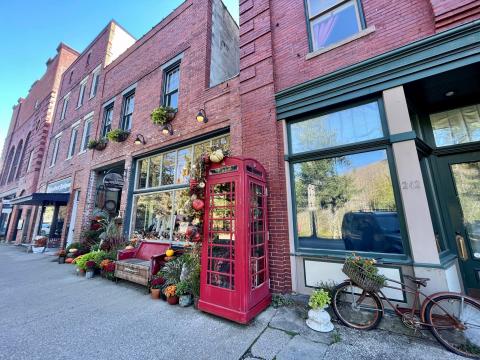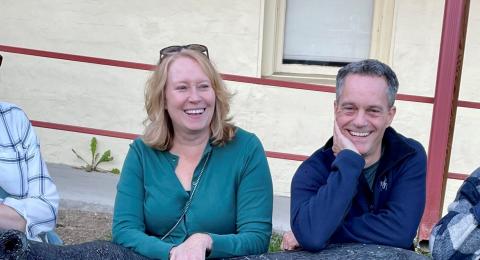UNH Extension Goes (Almost) Undercover as Tourists in West Virginia

Mayor Felton of Marlinton, West Virginia, a catalyst for making the town a primary destination for folks visiting the Monongahela National Forest.
What factors help rural communities across a region collectively build thriving and lasting tourism and recreation economies? This is a key question that a multi-state, Extension-based research collaboration between West Virginia University, Pennsylvania State University, the University of Vermont, the University of New Hampshire, and the Northeast Regional Center for Rural Development seeks to understand. In early October, the New Hampshire-based collaborator team (comprised of UNH Extension’s Jada Lindblom, Charlie French, and Rebecca Levy, joined by external project partner Tracy Hutchins, Executive Director of the Upper Valley Business Alliance) arrived at the Monongahela National Forest region of West Virginia with the task of exploring the region much as tourists would.
While this might sound like fun and games, this visit was actually a structured research activity, with the four team members each completing extensive assessments to pilot a revised version of the Extension partners’ Tourism First Impressions program. The trip had multiple objectives: 1) to co-develop and refine an assessment program that can be brought back to New Hampshire communities, 2) to provide tourism assessment data to West Virginia partners to help inform their project priorities, and 3) to learn from the project partners in West Virginia about their recent community-driven tourism initiatives.

Downtown Thomas, West Virginia.
Tourism First Impressions is an engagement program for communities and regions that helps them take stock of their tourism assets and guide them in developing strategies to enhance tourism. While growing the local economy is a key goal, the program puts an emphasis on identifying opportunities for growth that are in line with community goals. The program begins with data collection, which ultimately informs the development of the community strategy.
The research team from UNH Extension spent a whirlwind four days and three nights driving over 520 miles through West Virginia’s stunning upland red spruce forests and verdant river valleys to assess the strengths and opportunities of the growing tourism economies, focusing on the towns of Davis, Thomas, Elkins, Marlinton and Petersburg. Along the way, they met with local elected officials, chambers of commerce, business leaders, and community champions to learn about what makes each community unique and the strategies they’ve employed so far to build their local economies.

Wall mural in Marlinton, West Virginia
These Tourism First Impression assessments are just one part of the larger multi-state research project funded by a grant from the United States Department of Agriculture’s Agriculture and Food Research Initiative (AFRI). Led by Dr. Doug Arbogast from West Virginia University, the project arose from several Extension tourism specialists’ shared interests in analyzing the impacts of tourism development on rural communities, especially in light of recent impacts from COVID-19. The project aims to develop a shared set of metrics and programs that can help rural places sustainably develop their tourism and recreation economies. The project’s three focus regions, situated in West Virginia, Pennsylvania, and the Upper Valley of New Hampshire and Vermont, share commonalities as gateways to outdoor recreation amenities as well as other rural tourism offerings.
Soon, a team from West Virginia will conduct Tourism First Impressions assessments in the Upper Valley. Findings from the exchanges will help inform destination management plans for local communities by providing fresh perspectives through the lens of first-time visitors. In addition to generating reports for local partners from the Tourism First Impressions data, the multi-state research team also plans to share findings from visitor and resident surveys of the three rural region destinations.
The trip to West Virginia provided many inspiring examples to the New Hampshire team of how regional collaboration and committed leadership can help strengthen economies on a more local, town-based level. The team heard a variety of insights about how destination identities can evolve in ways that reflect community vision and a shared sense of pride in local heritage and natural amenities. While New Hampshire has its own special attributes to offer visitors, many aspects of rural development work – both challenges and opportunities – are shared across the country. As this project exemplifies, Extension’s nationwide network of tourism and economic development specialists creates rich opportunities for shared learning and research advancement.
For more information about the Monongahela National Forest Region, visit https://monforesttowns.com.

